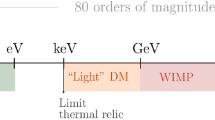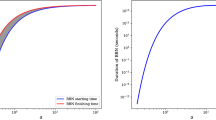Abstract
An heuristic hypothesis is advanced about dominant Bose statistics during the transition from the radiation era to the matter era in the early universe. It is shown that large scale Bose condensation of matter from baryon-antibaryon pairs is possible, as a result of which a colossal amount of mass may accumulate in a volume of cosmic scale. At a threshold density of matter, the structural bosons decay into the fermions of which they are composed, so that a sudden change in the symmetry of the wave functions of the particles causes a jump from Bose-Einstein to Fermi-Dirac statistics. This involves a large scale phase transition with an enormous pressure jump which may show up as a cosmological bang at the beginning of the matter era.
Similar content being viewed by others
References
Ya. B. Zel’dovich and I. D. Novikov, Structure and Evolution of the Universe [in Russian], Moscow (1975).
S. Weinberg, Gravitation and Cosmology, New York (1972).
S. Weinberg, The First Three Minutes. A Modern Look at the Origin of the Universe [Russian translation], Mir, Moscow (1981).
H. K. Avetissian, A. K. Avetissian, et al., ZhETF 74, 21 (1988); H. K. Avetissian, A. K. Avetissian, et. al., Sov. Phys. JETP 72, 26 (1991); Sov. Phys. JETP 73, 44 (1991); Phys. Rev. D54, 5509 (1996).
W. Fowler and F. Hoyle, Neutrino Processes and Pair Production in Massive Stars and Supernovae [Russian translation], Mir, Moscow (1967).
G. Feinberg and L. M. Lederman, The Muon and Muon Neutrinos, in: Modern Problems of Physics [Russian translation], Nauka, Moscow (1970).
V. A. Urpin and D. G. Yakovlev, Astrofizika 15, 647 (1979).
D. M. Sedrakian and A. K. Avetissian, Astrofizika 26, 489 (1987.
D. M. Sedrakian and K. M. Shahabasian, UFN No. 7, 161, 3 (1991).
A. Sedrakian and J. W. Clark, Phys. Rev. C73, 035803 (2006).
L. D. Landau and E. M. Lifshitz, Statistical Physics [in Russian], Vol. 9, part 1, Nauka, Moscow (1976).
L. Mandel and E. Wolf, Optical Coherence and Quantum Optics, Cambridge University Press (1995).
M. O. Scully and M. S. Zubairy, Quantum Optics, Cambridge University Press (1997).
Loudon, Rodney, The Quantum Theory of Light, Oxford University Press (2000).
G. S. Saakyan, Equilibrium Configurations of Degenerate Gaseous Masses [in Russian], Nauka, Moscow (1972).
D. G. Yakovlev and V. A. Urpin, Astron. zh. 57, 526 (1980).
Author information
Authors and Affiliations
Corresponding author
Additional information
__________
Translated from Astrofizika, Vol. 51, No. 1, pp. 161–172 (February 2008).
Rights and permissions
About this article
Cite this article
Avetissian, A.K. Cosmological bang as a consequence of a sudden change in the quantum statistics of nuclear matter. Astrophysics 51, 130–139 (2008). https://doi.org/10.1007/s10511-008-0014-5
Received:
Accepted:
Issue Date:
DOI: https://doi.org/10.1007/s10511-008-0014-5




